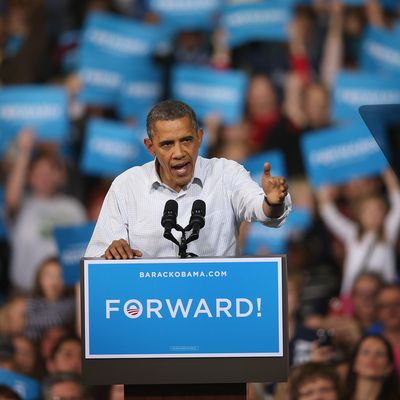
The latest and possibly last entrant to the GOP’s postelection recrimination is Noemie Emery, who argues in the latest Weekly Standard that Barack Obama won reelection not because of any stronger ideological appeal to the voters but merely because of his superior political charisma. Obama is “extravagantly gifted” and ran against “poor politicians.” No more ideological self-examination required! Just better pitchmen, please.
It is surely true that political skill counts for something. Ideology counts for something, too. So do basic fundamentals like the state of the economy. Political science models attempting to predict the outcome based on fundamentals generally split, and since Obama won by four points, it’s fair to say he did something to outperform what you’d expect of an incumbent overseeing a slow recovery, and skill as a candidate may be one of those things. (I think it probably was, along with his more middle-class-friendly economic agenda.)
But Emery isn’t just arguing for a tweak of the political science models. She’s creating a new model altogether. According to the Emery model, the result of any election is very simple: The more talented pol wins. Emery:
Since 1980, winners have come from the left, right, and center; been rich and poor, young and old, black and white; been fatherless waifs or children of power; and through it all, there has been only one constant: Each time, the prize has gone to the better political animal. …
[Mitt Romney and Hillary Clinton] had the words, and none of the music, so they lost to a man who had all the music, and was better with words than with deeds.
Emery actually uses the bulk of her article to review presidential election history to support her thesis that the more talented politician always wins. This ambitious contribution to the forecasting field does raise numerous questions, such as, How do you measure talent? Aren’t you just the teensiest bit worried that a model based on a completely subjective characteristic simply defines the winner, post hoc, as the better politician? Emery does not mention or allude to this obvious pitfall in her analytic method.
The trouble becomes clear when we consider Emery’s own previous claims that Obama is not a great politician at all but a terrible one. She has laid out this case at article length (Headline: “Overrated: Rumors of Barack Obama’s political skill have been greatly exaggerated.”) and in other stories, in which she has predicted such things as “the prospect of an enduring center-left governing coalition, which a year ago seemed a distinct possibility, is now gone.”
Conservatives may be relieved to learn that Emery has tweaked the methodology of her prediction model and now finds that Obama was a wildly talented campaigner, that his talents explain the entirety of his success, and indeed was a shoo-in to win all along, thus rendering all prior Emery predictions null and void.






























